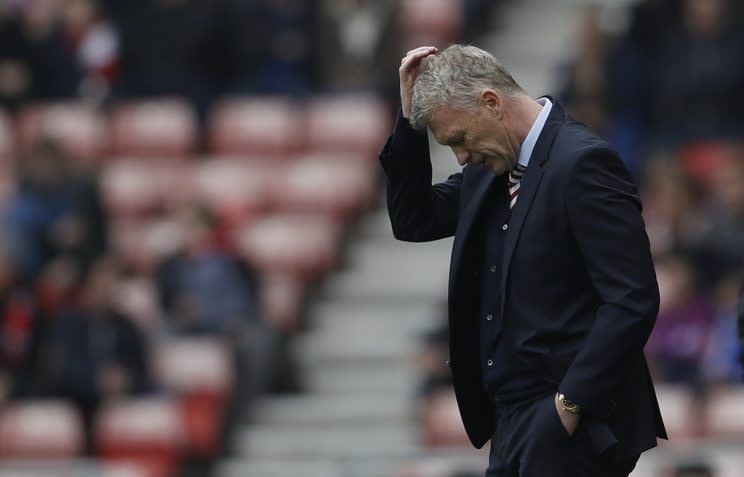David Moyes showed the scars of Manchester United during his Sunderland failure

The sacking of David Moyes from Sunderland could have happened at numerous points during the season. Like when he threatened to ‘slap’ BBC reporter Vicki Sparks, or when he submerged Sunderland in the relegation zone thanks to 26 Premier League defeats. Or even during December when he admitted he might not have taken the job at the Stadium of Light had he known of the club’s financial woes.
Amazingly, none of those were enough for Ellis Short to end Moyes’ time as Sunderland boss. Instead, the Scottish manager chose to resign on Monday, rather than spend more time in a job he seemed painfully disinterested in doing.
READ MORE: Gossip – Man City and Bayern ‘want Sanchez’, Chelsea ‘target James’
READ MORE: Europa League final is chance for Paul Pogba to underline his importance
Moyes had obvious motive for preferring to be sacked over resigning. There was speculation that Sunderland could not afford to do the former, with the Black Cats said to be well over £100mil in debt. A spate of job cuts at the club in February did little to dispel the idea that Sunderland are in financial difficulty, with a pay-off to Moyes an unwanted, (even if necessary) expense.
For Short personally, sacking Moyes was also a tacit admission he had made a mistake. The American had long wanted Moyes at the helm, revealing he had been his “number one managerial target for the last five appointments”.
READ MORE: Mourinho to sell Smalling after ‘losing patience’ with him
READ MORE: Alli – Tottenham do not need to spend big if we keep all our stars
“It is our aim to become a better, stronger and more stable football club and, with a manager of David’s calibre and experience at the helm, we have a fantastic opportunity to begin looking upwards, rather than downwards every season,” Short said when Moyes was confirmed.
However, what he failed to realise was the lasting impact a spell at Manchester United had on Moyes. “If I’d have known I only had 10 months, I would’ve approached the United job completely differently,” Moyes told FourFourTwo.
Pessimistic
The former Everton boss has consistently stated he was not given enough time to succeed at Old Trafford. However, his biggest difficulty seemed to be convincing himself he was good enough to fill Sir Alex’s position. His media handling style was dour, pessimistic, and often misguided. He spoke of “aspiring” to be like fierce rivals Manchester City, and also claimed Liverpool were “favourites” to win at Old Trafford.
His tactics were equally as baffling, with Moyes sometimes changing formations and team selections on the day of a game. When the club finally dispensed with his services in April the statement read as cold and brief. “The club would like to place on record its thanks for the hard work, honesty and integrity he brought to the role,” the club said.
Moyes had certainly acted with dignity, even if he had no one pushing for him to stay on at the end. He could, in theory, have fixed his reputation with success in his next role at Real Sociedad. Unfortunately, Moyes left the club in 16th position, with his replacement Eusebio guiding them to sixth in the league this season.
A return to England held the opportunity to show he had grown from his failures, instead Moyes seemed more inflexible than before. His transfers were almost exclusively players he had previously worked with — including a quintet of former Everton players.

Tactically, the Black Cats were negative, and uninspiring in attack, often choosing to hit it long to Jermain Defoe or Victor Anichebe. According to WhoScored, Moyes attempted 11 different formations this season, suggesting little confidence in his ideas.
The pessimism that had dogged his press conference at Old Trafford was also prevalent at the Stadium of Light. “[The fans are] probably right,” Moyes said in August. “It’s been the same for last few years [a relegation fight], I think it will be again. You can’t argue with the facts People are hoping for it to dramatically change, but it can’t. We hope that things will improve. Defensively, we have a young right-back and centre-half, but they need a lot of work and schooling.”
Most concerning of all though was how defensive Moyes was personally. “Maybe if I was a German manager, you might praise that, actually,” he said after Jurgen Klopp criticised his defensive tactics at Anfield. “If I had been German, you might have been saying, ‘Great, you’re doing something different.’”
The Scot now seemed thin skinned. The constant barrage of abuse and criticism he received while at Old Trafford had clearly left a mark. Moyes sought to rebuke every disparaging remark, and distanced himself from a mistake whenever possible.
“There is a clause in his contract,” Moyes said of Jermaine Defoe’s relegation release clause. “In my time as manager I wouldn’t have allowed a clause to be in there but it is and we have to honour the contract.”
Since David Moyes was awarded 6-year deal at Man Utd he's got two sackings & a resignation on CV…and still two of those six years to go.
— Phil McNulty (@philmcnulty) May 22, 2017
Despite being a club that has routinely changed their manager during the spring months, Sunderland opted to stick by Moyes. Even his last press conference, in which he quibbled Chelsea’s fifth goal in a 5-1 defeat suggested he was missing the point spectacularly.
All in all, it points to the fact Moyes needs a break from football. The scars of Manchester are still clearly visible, and while some may have used that failure as a learning opportunity, it seems Moyes has done the opposite and caused his managerial stock to plummet further than ever before.

 Yahoo Sport
Yahoo Sport 






































